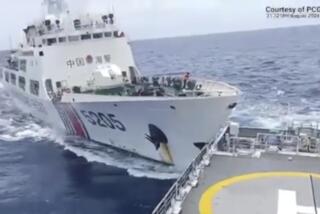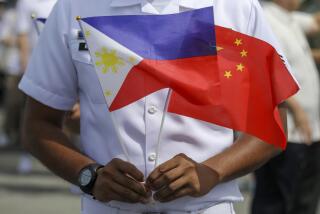Dispute Over Islands Exposes Tensions Between China, Vietnam
- Share via
BEIJING — An effort by China to strengthen its claims to sovereignty over islands in the South China Sea is provoking renewed tensions with Vietnam only eight months after the two countries normalized their relations.
Beijing and Hanoi fought a 1988 naval battle in the Spratly Islands in which dozens of Vietnamese sailors died, but tensions had eased until February, when China’s National People’s Congress passed a territorial-waters law asserting Beijing’s right to use military power to enforce control over both the Spratly and the Paracel island chains. Together, the islands sweep across vast stretches of the South China Sea.
The new conflict coincides with the reported eruption of a gun battle in May between frontier guards on the Sino-Vietnamese border, where the two countries fought a brief but bitter war in 1979.
While the South China Sea islands themselves are virtually uninhabited and economically worthless, they are believed to sit atop valuable underwater oil deposits. All or some of the islands are also claimed by Malaysia, Brunei, the Philippines and Taiwan. Each of the claimants has actual control of some islands. In addition to possible economic benefits, sovereignty over the islands could carry major strategic value in military and geopolitical terms.
The United States could be drawn directly into the dispute as a result of the signing in May of a contract between Chinese authorities and Denver-based Crestone Energy Corp. to explore for oil and gas in the Spratlys.
Crestone President Randall C. Thompson has been quoted as saying that China promised to use its navy to “protect and defend” Americans working on the islands. The area scheduled for oil exploration is also claimed by Vietnam.
Chinese Foreign Ministry spokesman Wu Jianmin, asked Thursday about the dispute, said “the legal rights and interests of foreign investors conducting business on Chinese territory will be protected by Chinese laws.”
Wu also said Beijing and Hanoi are preparing for a special meeting on the issue.
An informal four-day conference in Yogyakarta, Indonesia, this week brought together representatives of each of the claimant nations.
“Vietnam would try to avoid any possible conflict which would affect the peace and stability in the region,” said Tran Cong Truc of the Vietnamese Continental Shelf Committee.
China’s representative, Zhao Weihong, a Foreign Ministry official, sought to ward off any Western intervention with a warning at the conference that “any interference by any state outside the region will certainly complicate the problem.”
Hanoi is believed to have responded to the Chinese territorial-waters law with secret diplomatic protests this spring.
The British news agency Reuters, in a report Friday from Hanoi that revealed growing Vietnamese anger over the issue, quoted an anonymous government official who declared: “People think relations are OK between Vietnam and China, but they are not. The Chinese are pursuing a double-faced policy.”
This official said that Chinese and Vietnamese border guards exchanged fire near the Friendship Gate crossing in May. He would not release details of casualties but said no one was killed.
More to Read
Sign up for Essential California
The most important California stories and recommendations in your inbox every morning.
You may occasionally receive promotional content from the Los Angeles Times.













